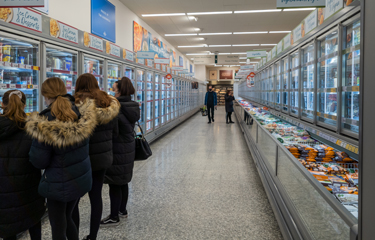The rate of grocery price inflation in the United Kingdom has fallen for the first time in two years, according to new data, while chilled fish prices continue to dampen sales.
Overall grocery inflation for the most recent four weeks declined slightly by 0.1 percent to 14.6 percent, according to Kantar. As a result, take-home grocery sales increased by 5.9 percent for the 12 weeks ending 27 November, the fastest level of growth since March 2021.
Chilled fish inflation rose 4.8 percent, but the category’s price hikes are still lower than price increases in fresh meat and poultry, which rose 9.8 percent for the 12 weeks ending 30 October.
“Price rises of 4.8 percent [in chilled fish] are lower than many alternatives but high baseline prices means it is still vulnerable to downtrading,” Kantar said in its Meat, Fish, and Poultry monthly report. “Chilled fish volume losses of 8.2 percent are too much to be offset by price increases, and consequently, the category is in overall decline.”
Overall chilled fish sales dropped 3.7 percent to GBP 463.5 million (USD 566, EUR 538 million) in the most recent quarter. Smoked fish realized the biggest sales decline, dropping 12 percent, followed by battered fish, which dropped 8.4 percent.
“The underperformance of battered suggest the interaction between chilled and frozen fish will be important to watch through the winter. Coated fish is more prominent in the freezer aisle, and therefore, its chilled equivalent could be vulnerable to losses to frozen,” Kantar said.
Added-value product sales also decreased by 5.3 percent, while sales of breaded items declined 1.9 percent and shellfish sales dropped 1.8 percent.
Natural fish is the only sub-sector within chilled fish where sales are increasing – gaining 1.1 percent during the quarter – even though it is one of the most expensive proteins, Kantar noted.
"This shows that shoppers are willing to pay more if they feel there is a justification,” the firm said.
It is possible that shoppers are trading down from seafood to chicken and pork, which are “overperforming in terms of volume, declining only 0.1 percent and 1.0 percent respectively, despite the fact that chicken has experienced the largest price increases of all proteins (up 17 percent during the quarter),” Kantar said.
The average price of chicken is GBP 4.31 (USD 5.26, EUR 5.00) per kilogram, less expensive than both beef and pork, according to Kantar. With the slight decline in inflation, food suppliers and grocery stores are expected to benefit from increased purchases closer to Christmas.
“The combination of inflation and festive spending means that the coming month is on course to be the biggest ever for take-home grocery sales,” Kantar Head of Retail and Consumer Insight Fraser McKevitt said. “December looks set to be a record-breaking month, with sales going above the GBP 12 billion [USD 14.7 billion, EUR 13.9 billion] mark for the first time.”
Consumers are pushing their seasonal purchases until later this year as they try to manage budgets in the run-up to Christmas Day.
“We’re expecting Friday 23 December to be the busiest day for pre-Christmas shopping,” McKevitt said.
Grocery inflation “still has a long way to come down,” McKevitt said.
“Based on the current rate, shoppers will have to spend an extra GBP 60 (USD 73, EUR 70) in December to buy the same items as last year," he said.
The cost of a traditional Christmas dinner for four has hit GBP 31 (USD 38, EUR 36) in 2022, according to Kantar.
“[It's] an example of just how much rising prices are impacting people at the tills and in their daily lives,” McKevitt said.
To mitigate rising grocery prices, shoppers are buying more private label products, and shopping at discounters more frequently.
Private label sales are up 11.7 percent compared to this time last year, while premium own label sales rose 6.1 percent in November.
The strong growth of the discounters continued over the most recent quarter, as both Aldi and Lidl opening new stores across Britain, Kantar said. Lidl’s year-on-year sales increased by 22 percent, while Aldi’s sales rose 24.4 percent.
Asda’s sales grew ahead of the sector, up by 6.1 percent, while Tesco’s sales increased by 3.9 percent and Sainsbury’s sales increased by 4.3 percent.
Photo courtesy of 1000 Words/Shutterstock







